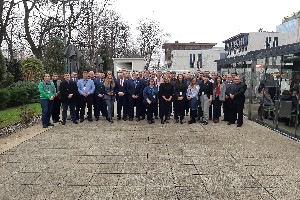
Bosnia and Herzegovina is taking action to improve its road safety situation. This is reflected in the country’s decreasing rate of road traffic fatalities – from 17.7 per 100,000 population in 2013, to 15.7 in 2016 (below the average for middle income countries of around 19 deaths per 100,000 population), according to WHO estimates. Supporting the government to further strengthen its efforts, UNECE, in cooperation with UNDP Bosnia and Herzegovina, has assisted the Ministry of Transport and Communications to make a first step in the preparation of the country’s Framework Road Safety Strategy and the Action Plan for 2021–2025, in line with the Sustainable Development Goals.
A two-day workshop and policy dialogue on “Transport‐related SDGs and Road Safety System” held this week in Sarajevo brought together all relevant road safety stakeholders to identify key points to be taken into account by the Ministry in preparation of the Strategy.
Participants discussed how the UN Global Framework Plan of Action for Road Safety can provide a basis for the strategy’s preparation and how efficient implementation of UN road safety legal instruments, administered by UNECE, could support the establishment of a comprehensive legal and regulatory framework. International best practice embedded in UN Conventions provide the basis to legislate and take concrete measures to address the major causes of road accidents.
The workshop recommended including a safe system approach as an integral element of transport system planning and governance, especially for vulnerable road users and in urban areas. It further recommended efforts to strengthen institutional capacity for efficient implementation of road safety laws and enforcement, improvement of vehicle safety, safer infrastructure, public transport, and collection and dissemination of accurate, comparable and disaggregated road safety related data.

Committing to renewed action to reduce road traffic deaths by at least 50% in line with the SDGs, participants recommended setting targets to reduce fatalities and serious injuries, for all groups of road users and especially pedestrians, cyclists and motorcyclists. To help track progress and streamline policy measures, UNECE, together with representatives of the Western Balkans countries, presented a framework for transport-related SDGs monitoring and reporting. International experts offered expert advice on how to prepare national strategy and, together with UNECE, strengthened capacities of Bosnia and Herzegovina stakeholders to improve national road safety statistics.
The Minister of Communications and Transport of Bosnia and Herzegovina, H.E. Mr Vojin Mitrović, recalled that the SDGs represent a universal call to action, highlighting that sustainable transport is crucial to meeting many Goals, including on health, energy, infrastructure, cities and communities.
The workshop recommended further efforts to speed up the shift toward safer, cleaner, and more energy efficient transport and promote higher levels of physical activity such as walking and cycling as well as the use of public transport to achieve sustainability.
Learn more about how UNECE supports countries for the development of safe and sustainable transport for the 2030 Agenda: https://www.unece.org/trans/welcome.html
Photo credit: Ministry of Communications and Transport of Bosnia and Herzegovina

